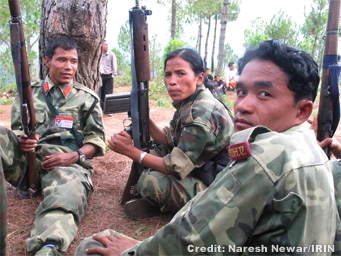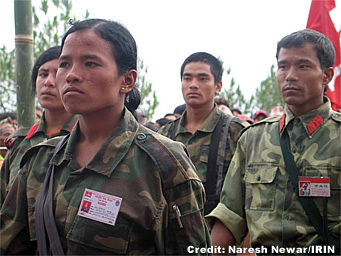|
Nepal
in Crisis 2006: Facts - Peace Process
|
|
Rebels
and government to hold decisive peace talks
|
 |
KATHMANDU,
19 Sep 2006 (IRIN)
Maoist
rebel leaders and Nepal's seven-party interim government will hold talks
within 10 days in an effort to rekindle the faltering peace process, designed
to end a decade-long conflict in the Himalayan country.
Over
the past five months, the Maoists and the seven parties have been actively
engaged in the peace process following the end of the absolute rule of
the Nepalese monarch, King Gyanendra, after a mass uprising in April.
However,
concerns are rising on both sides about a growing mistrust between them
and the lack of effective progress on ending violent in the kingdom, according
to members of the negotiating teams.
 |
| <<
Maoist rebels have been involved in the peace process with the interim
government to end the decade-long armed conflict in Nepal
"This
time the talks will come up with clear decisions and remove all the obstacles
in our way," said home minister Krishna Prasad Sitaula, who is also the
coordinator of the government talks team.
Sitaula
told reporters on Sunday that decisions would be made on key issues such
as arms management, framing an interim constitution to replace the existing
one and forming a new interim government to include the Maoists.
So
far, the Maoists have failed to agree to government demands to disarm their
People's Liberation Army (PLA). |
|
Similarly,
the seven parties have also refused Maoist demands to dissolve the existing
parliament, which does not currently include Maoist representatives.
Thn
a bid to bring both sides together, Prime Minister Girija Prasad Koirala
and rebel chief Prachanda agreed on resolving all the political problems
to allow the peace process to carry on, the home minister said.
top
 |
| <<
PLA fighters
"The
meeting between the prime minister and Prachanda was significant in enabling
the peace process to go forward," said Ian Martin, Personal Representative
of the United Nations Secretary-General in Nepal.
Martin,
who previously headed the UN Office of High Commission for Human Rights
(OHCHR) in Nepal, was recently appointed in his new position to lead the
UN mission to support in the peace process in the Himalayan kingdom in
response to the joint request by the Maoists and the interim government. |
|
Although
the UN will not be directly involved in the negotiations between the two
sides, the body will play an advisory role through the help of its military,
ceasefire and monitoring experts who are expected to arrive soon, Martin
said. "Such a [top level] meeting was a positive signal to remove mistrust
and suspicion between both sides," he added.
For
the last 10 years, the Maoists had been waging an armed rebellion against
the state with demands for a new constitution and a communist republic.
The violent clashes between the two sides have cost the lives of nearly
14,000 people, including over 400 children at the hands of both the rebels
and state armed forces, according to local human rights group Insec.
top
Credit
IRIN 2006
Copyright
© UN Office for the Coordination of Humanitarian Affairs 2006
[
This report does not necessarily reflect the views of the United Nations]
Integrated
Regional Information Networks (IRIN), part of the UN Office for the Coordination
of Humanitarian Affairs (OCHA).

|





